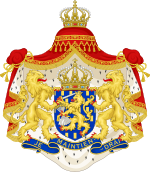- Dutch linguistic influence on naval terms
-
History of the Netherlands 
This article is part of a seriesEarly History Germanic tribes Roman Era Migration Period Medieval Frankish Realm/The Franks Middle Francia Holy Roman Empire Burgundian Netherlands Seventeen Provinces Republic Eighty Years' War United Provinces The Golden Age The Batavian revolution Monarchy Batavian Republic Kingdom of Holland First French Empire United Kingdom of the Netherlands Modern History Netherlands in World War II Netherlands Topics Military History Dutch Language Dutch literature Naval influence Inventions and discoveries Luctor et Emergo Dutch heraldry
Netherlands Portal
Historically, many Dutch military terms have been influential and adopted as loanwords by many other languages all over the world. Although most of these words are connected to naval activities, some (such as "forlorn hope") relate to land warfare.
Some Dutch naval terms adopted by the various languages include:
From Dutch "boei", from Latin boia (shackle) Language Variant Danish Bøje English Buoy French Bouée German Boje Italian Boa Norwegian Bøye (buoy) Polish Boja Slovak Bója Swedish Boj (Buoy), Boja (Shackle) From Dutch "kielhalen " meaning to drag along the keel Language Variant English Keelhauling Finnish Kölihaalaus (likely borrowed from Swedish form) German Kielholen Norwegian Kjølhaling Slovak Kýl Swedish Kölhalning From Dutch "dek " meaning "covering" Language Variant English Deck German Deck Norwegian Dekk Swedish Däck Other words (in English) include:
- Drill, from the verb drillen, to train/instruct
- Freebooter (Pirate), from vrijbuiter.
- Yacht, from jacht meaning hunt
- Pump, from pomp.
- Sloop, from sloep.
- Skipper, from schipper meaning someone who ships.
- Keel, from kiel
- Maelstrom, from maalstroom meaning "strong current" (borrowed via a Nordic language)
- Forlorn hope, from verloren hoop "lost hope".
- Cruiser, from the verb to cruise from Dutch doorkruisen meaning to sail across or go through.
- Brandy, from Dutch brandewijn, distilled wine.
And many more.
Sources
See also
Categories:- Dutch language
- Nautical terms
- Historical linguistics
Wikimedia Foundation. 2010.
